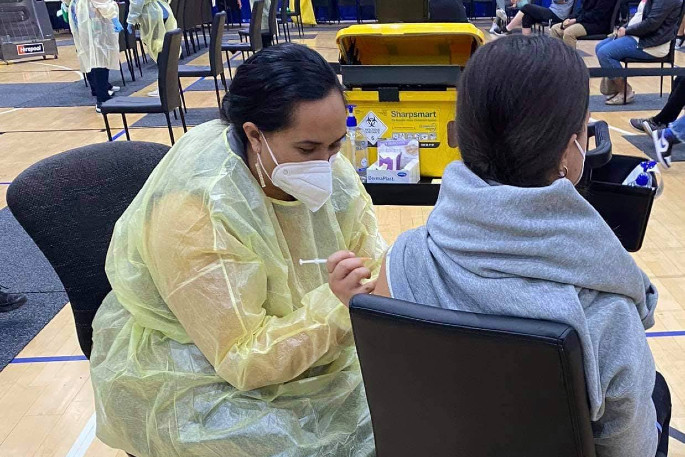Almost a million people are eligible for a Covid-19 vaccine booster from today and there are concerns the system will not be able to cope.
The interval between the second dose and a booster has been cut from six to four months, making 82 per cent of vaccinated New Zealanders eligible for a booster by the end of February.
Added to that, 5-11-year-olds can get their first vaccine dose from 17 January.
Vaccination providers are expecting strong demand - but there are also concerns some people may choose not to get a booster.
The director of public health, Dr Caroline McElnay, says the best defence against the Omicron variant was two doses of the Pfizer vaccine and a booster shot.
It's not clear why 28 per cent of those eligible for boosters last year had not yet taken them up, she says.
"It may have been because of the holidays. But now as people are coming to the end of holidays, getting back to work, health clinics being up and running again, we really want to encourage people to go and get their booster."
The Pharmacy Guild is expecting significant demand. Chief executive Andrew Gaudin said 1.33 million New Zealanders were fully vaccinated by early September, and of those about 358,000 have already received boosters.
"I think people might take their time, there's walk-ins, or bookings where you can, and you can use bookmyvaccine from January 17 - I think people might choose to manage their time wisely over the holiday break.
"So encouraging everyone to go to their trusted places, certainly community pharmacies with over 350 of those providing vaccinations across New Zealand. There may be some reduced capacity over the holiday period, but do check it out on healthpoint.co.nz."
Epidemiologist Amanda Kvalsvig says the country is heading for problems on January 17 - when paediatric vaccinations start, and BookMyVaccine.nz takes bookings for the shortened interval of boosters.
"We can all see that NZ is heading for a massive appointment pile-up on Jan 17, so what action is being taken to avoid that?" she said. "On a more strategic level, all of these issues could have been avoided by being proactive. The traffic light system is already out of date - it's almost completely designed around a two-dose vaccine course and an assumption that this would be highly protective.
"It was already apparent in August that ideally, vaccines for children should be rolled out in school during Term 4 so that as many as possible would be protected before summer/ Delta escape/ next variant/ whatever might be down the track. The NZ response urgently needs to get ahead and work proactively."
Shift in gap important given Omicron threat - immunologist
Otago University immunologist Dianne Sika-Paotonu says she shares the concern of others that the country "may end up with a situation where there's [an appointment] pile-up".
"However, what we should keep in mind is that we've had vaccinations being delivered over the past while and it would stand to reason that second time round, third time round rather for the booster levels, that things might go a bit more smoothly with respect to delivery."
Delta is still in the community and low testing numbers could mask its true extent, while young children remained unprotected, she says.
"Importantly, we've now had a shift in the gap between the date of the second primary vaccine dose and the booster dose. So that's shifted from a minimum gap of six months down to four months. And that's been a really important step given the risk that Omicron poses for everyone."
Equity issues must be at the forefront of the booster and paediatric roll-out, bringing down barriers to vaccination, building trust and prioritising the vulnerable, she says.
The government has already decided on mandatory boosters for staff in some roles and more details on other sectors are expected later this month.



0 comments
Leave a Comment
You must be logged in to make a comment.